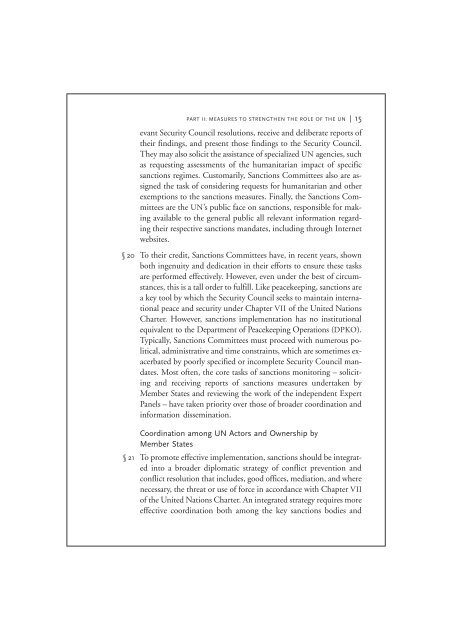Making Targeted Sanctions Effective - Small Arms Survey
Making Targeted Sanctions Effective - Small Arms Survey
Making Targeted Sanctions Effective - Small Arms Survey
You also want an ePaper? Increase the reach of your titles
YUMPU automatically turns print PDFs into web optimized ePapers that Google loves.
§ 20<br />
PART II: MEASURES TO STRENGTHEN THE ROLE OF THE UN | 15<br />
evant Security Council resolutions, receive and deliberate reports of<br />
their findings, and present those findings to the Security Council.<br />
They may also solicit the assistance of specialized UN agencies, such<br />
as requesting assessments of the humanitarian impact of specific<br />
sanctions regimes. Customarily, <strong>Sanctions</strong> Committees also are assigned<br />
the task of considering requests for humanitarian and other<br />
exemptions to the sanctions measures. Finally, the <strong>Sanctions</strong> Committees<br />
are the UN’s public face on sanctions, responsible for making<br />
available to the general public all relevant information regarding<br />
their respective sanctions mandates, including through Internet<br />
websites.<br />
To their credit, <strong>Sanctions</strong> Committees have, in recent years, shown<br />
both ingenuity and dedication in their efforts to ensure these tasks<br />
are performed effectively. However, even under the best of circumstances,<br />
this is a tall order to fulfill. Like peacekeeping, sanctions are<br />
a key tool by which the Security Council seeks to maintain international<br />
peace and security under Chapter VII of the United Nations<br />
Charter. However, sanctions implementation has no institutional<br />
equivalent to the Department of Peacekeeping Operations (DPKO).<br />
Typically, <strong>Sanctions</strong> Committees must proceed with numerous political,<br />
administrative and time constraints, which are sometimes exacerbated<br />
by poorly specified or incomplete Security Council mandates.<br />
Most often, the core tasks of sanctions monitoring – soliciting<br />
and receiving reports of sanctions measures undertaken by<br />
Member States and reviewing the work of the independent Expert<br />
Panels – have taken priority over those of broader coordination and<br />
information dissemination.<br />
§ 21<br />
Coordination among UN Actors and Ownership by<br />
Member States<br />
To promote effective implementation, sanctions should be integrated<br />
into a broader diplomatic strategy of conflict prevention and<br />
conflict resolution that includes, good offices, mediation, and where<br />
necessary, the threat or use of force in accordance with Chapter VII<br />
of the United Nations Charter. An integrated strategy requires more<br />
effective coordination both among the key sanctions bodies and
















